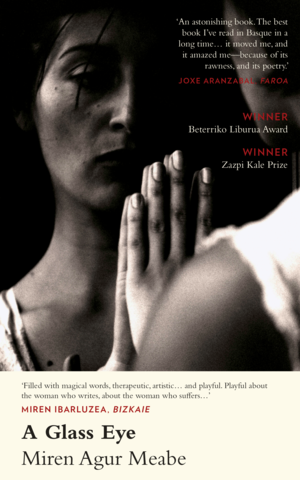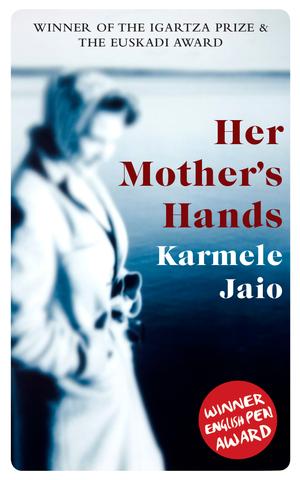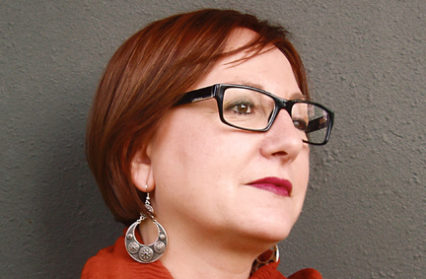Caroline Stockford reviews two books written by women from the Basque country published in translation by Parthian Books this year.
This summer, Parthian Books published two captivating books by Basque women writers Miren Agur Meabe and Karmele Jaio. Meabe, a Biscayan writing in Basque, is a poet and author who has won 13 literary awards stretching back to 1981. Jaio on the other hand, is a debut novelist, winner of an English PEN Translates award and her book, Her Mother’s Hands, quickly became the best selling book in Basque literature for some time.
 A Glass Eye, by Meabe, is the account of a woman who has just broken away from a two year relationship with a man referred to by the initial ‘M’. The book details her move to another country and her reflections on her love affair and is particularly interesting in terms of her way of articulating the pain of break up. The chapters are extremely short, sometimes no more than a page or page and a half, resembling a patchwork of memories; the author returning to themes that she has approached throughout her career. There is a great contrast between the extremely personal and intimate and the clinical, factual inserts on the subject of occularists and the manufacture and fitting of the glass eye of the title (Meabe had one fitted as a child). The author writes about her mental health, her state of mind, the definition of her own personality. The searing honesty with which the book begins is spellbinding.
A Glass Eye, by Meabe, is the account of a woman who has just broken away from a two year relationship with a man referred to by the initial ‘M’. The book details her move to another country and her reflections on her love affair and is particularly interesting in terms of her way of articulating the pain of break up. The chapters are extremely short, sometimes no more than a page or page and a half, resembling a patchwork of memories; the author returning to themes that she has approached throughout her career. There is a great contrast between the extremely personal and intimate and the clinical, factual inserts on the subject of occularists and the manufacture and fitting of the glass eye of the title (Meabe had one fitted as a child). The author writes about her mental health, her state of mind, the definition of her own personality. The searing honesty with which the book begins is spellbinding.
Meabe has formerly used her poetry to try to discuss bodies in terms of their language of movement and this book too covers the body freely, noting the effect of the menopause on women’s skin, sex drive, mood, the physical self. It’s disappointing to see the menopause referred to as ‘the dangerous age’, and there are some missed opportunities to examine the liberation of a woman mentally, physically and hormonally from the constraints of procreation and the male gaze.
In terms of the translation, it takes a few pages to begin to enjoy both the translation and the original voice, the register and style of both the author and translator. But this translation is playful and enjoyable. Having a Basque woman translate the book gives the tone more joy and warmth than perhaps if a native-speaker of English had translated it, employing a more correct, formal, and perhaps higher, register. The translator, Amaia Gabantxo, in fact is a famous one, prolific in her work and flamenco dancer to boot, which may account for some of the energy in the language.
Given that the author is a poet, I would have liked to have seen a bit more cohesion in the book and an infusion of a lot more poetry. The Glass Eye might have been a long prose-poem with the inserts of medical data, but instead we make do with occasional, beautiful poetic bursts such as ‘The sun is like the inner face of an oyster on a matt sky.’
The Glass Eye is a frank appraisal of a woman’s appetite for an unattainable man; the familiar scenario of any individual who persists in pouring energy into the vortex of another who is no more than an absorption board for that heat. But it is also about the tapestry of life, and influences of the past on the present. It’s a delicate attempt over a long time, of retrospect and hindsight to make sense of family history, and of great pain and suffering and the central stories of our universe: dichotomy; union and separation.
 Karmele Jaio’s book, My Mother’s Hands, is an intimate story, full of silence, acute observation, and palpable warmth. It explores the parallel stories of the mother and daughter via their two ‘lost loves’. One, a revolutionary figure whose departure from town was dramatic and sudden and the mother’s young love, who never returned from the sea.
Karmele Jaio’s book, My Mother’s Hands, is an intimate story, full of silence, acute observation, and palpable warmth. It explores the parallel stories of the mother and daughter via their two ‘lost loves’. One, a revolutionary figure whose departure from town was dramatic and sudden and the mother’s young love, who never returned from the sea.
‘Nerea’s first words are awkward, slow. As if she didn’t know where to start. And she really doesn’t know where to start. But once she starts, one word follows another and they all slide together, like fish in a net slide one after another when the net is tipped out onto the ground.’
In an interview with Parthian earlier this year, Jaio mentioned how she enjoys exploring ‘the difficulties of communication between people’. This is interesting territory, for we more often than not do not delve into deep interrogations or ask difficult questions of even those nearest to us for the sake of keeping the status quo in our lives. Jaio also mentioned the importance of translation to the Basque language in the interview,
‘The language is also very important to me at this point, because writing in a minority language is always a choice… Translation is, obviously, important for us. For Basque literature and for Basque writers it is very important to be translated.’
The book is translated skilfully and consistently by Kristin Addis, translator of other Basque women authors such as Lourdes Oñederra, and was winner of an English PEN translation award and the Igartza Prize. It’s executed in a ‘less passionate’ register than the other book here-reviewed. There are many pages where the present continuous is employed, which may also be there in the original Basque, but which lessens much of the impact, and may have benefited from a more ambiguous aorist. This is a story of frozen moments amidst the business of pressing lives. A portrayal of a mother and daughter who are both women with their own histories, loves and secrets. It’s a very ‘real’ book about facing up to realities, to endings and the ever-changing shape of our existence.
Both books are available now from Parthian.
You might also like…
Carla Manfredino reviews Bondo by Menna Elfyn, a collection of language poems which are lyrical, poignant, and quintessentially Welsh.
Caroline Stockford is a poet and Turkish literary translator from Barmouth in north Wales. She works advocating for freedom of expression and imprisoned writers and journalists in Turkey as Norwegian PEN’s Turkey Adviser. She is a member of Wales PEN Cymru and Chair of the Search Committee of PEN International. Her translations from Turkish can be viewed at: estoniacordfrock.wordpress.











